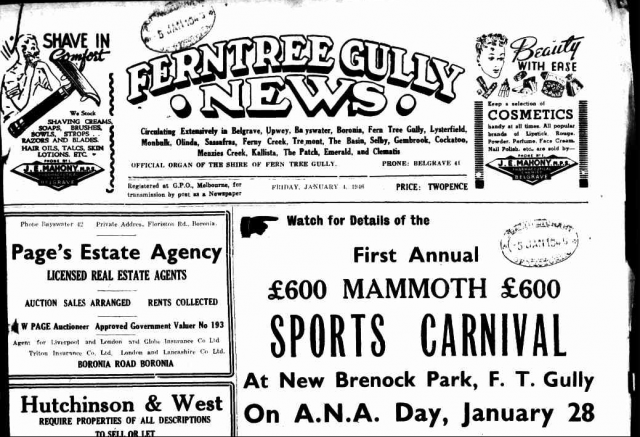By Parker McKenzie
Trove — the National Library of Australia’s research portal —has been a valuable resource for historians, researchers, academics and journalists since it was first launched in 2009.
The digital platform gives free access to over 6 billion historical items from around 900 Australian institutions, from newspapers, birth and death records, magazines, books, letters, music, audio and more.
Publications from the Yarra Ranges throughout history such as the Lilydale Express (1886 – 1897; 1914 – 1955), the Wandin Yallock, Upper Yarra, Yarra Glen and Healesville Chronicles (1898 – 1914) and the Healesville Guardian (1942 – 1954) can be found on Trove.
According to the 2022 Trove Strategy, produced by the National Library of Australia, without additional funds, the Library “will need to cease offering the Trove service entirely,” and only currently has the resources to maintain it until June 2023.
President of the Monbulk Historical Society Armin Richter said if this happened, it would “mean the loss of an incredible tool for searchers, historians, Historical Societies and individuals who want to quickly and conveniently look something up from wherever they may be.”
“The ease of use and the vast amount of digitised information on hand means that it has just about become the first port of call when checking up on a historical event or even just an individual name,” he said.
“Before Trove, it was necessary to go to the State Library and read through the microfilmed newspapers which were both time-consuming and also made it easily possible to miss something obscure which the Trove digital word recognition picks up.”
Most of the newspapers digitised in Trove are from the 1830s to the 1950s, with newer papers often unavailable due to copyright restrictions.
Mr Richter said it isn’t just a government-funded resource, with many individuals and groups paying to digitize items to be made available for the wider public, free of charge.
“Wayne Hodges, in particular, has been a driving force in helping to get mountain district newspapers around the Ferntree Gully and Belgrave districts digitized,” he said.
“It would be a sad loss if that time, effort and money was spent for nothing.”
Some of the local newspapers digitised with the assistance of Mr Hodges, the Dandenong Ranges Historical Council, Eastern Regional Libraries, Knox City Council and the Knox Historical Society include the 1920-21 Mountaineer, 1921-22 The Pilot, 1923-47 Ferntree Gully News and the 1947-54 Free Press.
Mr Hodges, who runs the Digitise Knox and Dandenong Ranges’ News site, said care grants from Knox City and Yarra Ranges councils and the Public Records Office of Victoria alongside community fundraising have uploaded 35 years from five newspapers to be searchable on Trove.
“The situation is that Federal Government funding for the Trove platform runs out in July,” he said.
“Federal Arts Minister Tony Burke has promised to end the cultural wars by addressing the needs of the National Library of Australia and Trove in a Federal Government Culture Plan due to be released on 30 January, although the funding allocated will not be revealed until the Federal Budget release in May.”
Mr Burke was contacted for comment.
Mr Hodges said Trove benefits the local community and Australians in a range of ways.
“It allows people to locate library items in other libraries. The digitised newspapers also benefit heritage tourism, historical societies, galleries, libraries, archives and museums, schools and universities, journalists and the publishing sector,” he said.
“If Trove is discontinued or not as accessible great benefits will be lost. For a small expense, great returns can be realised.”
Support from the local community benefits trove too. Mr Richter has corrected over 130,000 lines of text in Trove himself but said he wouldn’t be in the top 500 people who have helped the digital collection in this way.
“Over 70,000 individuals have now corrected over 450,000,000 lines of text which makes searches more definitive for the future,” he said.
“Many people who do genealogy can quickly find ancestors through the Births, Deaths and Marriages columns which would often have been near impossible before Trove.”
Funding for the platform has been uneven at best under the previous Coalition government. After cuts to funding in 2016, a campaign to save Trove helped secure a funding package for the National Library, however, without sustained and secure funding Trove’s future remains in doubt.







